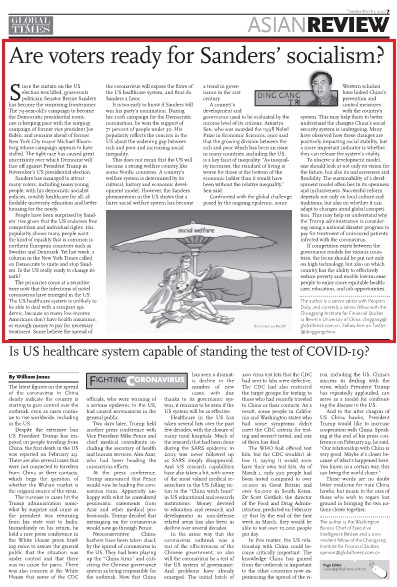Global Governance
Your Present Location: PROGRAMS> Global GovernanceDing Gang: Are voters ready for Sanders’ socialism?
By: Ding Gang Source:Global Times Published: 2020-03-04
Since the curtain on the US election was lifted, grass-roots politician Senator Bernie Sanders has become the surprising frontrunner. The 79-year-old's campaign to become the Democratic presidential nominee is keeping pace with the surging campaign of former vice president Joe Biden, and remains ahead of former New York City mayor Michael Bloomberg whose campaign appears to have stalled. The tight race has caused great uncertainty over which Democrat will face off against President Trump in November's US presidential election.
Sanders has managed to attract many voters, including many young people, with his democratic socialist policies, notably healthcare for all, affordable university education and better housing for the needy.
People have been surprised by Sanders' rise given that the US endorses free competition and individual rights. His popularity shows many people want the kind of equality that is common in northern European countries such as Sweden and Denmark. Yet last week, a column in the New York Times called on Democrats to unite and stop Sanders. Is the US really ready to change its path?

The primaries come at a sensitive time now that the infections of novel coronavirus have emerged in the US. The US healthcare system is unlikely to be able to deal with a rampant epidemic, because so many low-income Americans don't have health insurance, or enough money to pay for necessary treatment. Some believe the spread of the coronavirus will expose the flaws of the US healthcare system, and thus do Sanders a favor.
It is too early to know if Sanders will win his party's nomination. During his 2016 campaign for the Democratic nomination, he won the support of 71 percent of people under 30. His popularity reflects the concern in the US about the widening gap between rich and poor and increasing social inequality.
This does not mean that the US will become a strong welfare country like some Nordic countries. A country's welfare system is determined by its cultural, history and economic development model. However, the Sanders phenomenon in the US shows that a fairer social welfare system has become a trend in governance in the 21st century.
A country's development and governance used to be evaluated by the income level of its citizens. Amartya Sen, who was awarded the 1998 Nobel Prize in Economic Sciences, once said that the growing division between the rich and poor which has been an issue in many countries, including the US, is a key facet of inequality. "As inequality increases, the standard of living is worse for those at the bottom of the economic ladder than it would have been without the relative inequality," Sen said.
Confronted with the global challenge posed by the ongoing epidemic, some Western scholars have linked China's prevention and control measures with the country's system. This may help them to better understand the changes China's social security system is undergoing. Many have observed how these changes are positively impacting social stability, but a more important indicator is whether they can release the system's vitality.
To observe a development model, one should look at not only its vision for the future, but also its inclusiveness and flexibility. The sustainability of a development model often lies in its openness and inclusiveness. Successful reform depends not only on local culture and traditions, but also on whether it can adapt to changes amid global competition. This may help us understand why the Trump administration is considering using a national disaster program to pay for treatment of uninsured patients infected with the coronavirus.
If competition exists between the governance models for various countries, the focus should be put not only on high technology, but also on which country has the ability to effectively reduce poverty and enable low-income people to enjoy more equitable healthcare, education, and job opportunities.
The author is senior fellow with the Chongyang Institute for Financial Studies at Renmin University of China.























































































 京公网安备 11010802037854号
京公网安备 11010802037854号





